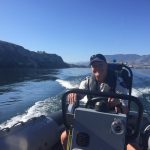Column: From the Hill -- Invasive Species Action Inadequate
Lost in the recent media frenzy over the SNC Lavalin scandal were the 2019 Spring Reports of the Commissioner of the Environment and Sustainable Development. These last reports from Julie Gelfand before her retirement focused on protection of fish and their habitat from mining effluent, subsidies to the fossil fuels industry and—of particular interest to the Okanagan and Kootenay regions–government action to deal with aquatic invasive species.
The commissioner found the department of Fisheries and Oceans did not determine which aquatic invasive species and pathways posed the greatest risks to Canada. The Department lacked a coherent process to identify which assessments were most needed, did not have a complete inventory of its risk assessments, and had no consistent way of reviewing the results to determine how to use them. She also found Fisheries and Oceans Canada did not systematically collect or maintain information to track aquatic invasive species or the extent of their spread.
Commissioner Gelfand also audited how the Canada Border Services Agency and Fisheries and Oceans prevented the entry zebra mussels into Canada at border points in Manitoba and New Brunswick. She found neither agency effectively prevented the entry of this invasive species into Canada at those sites and presumably elsewhere in the country.
In her report, Gelfand also singled out British Columbia saying, “During our audit, Fisheries and Oceans Canada provided three-year funding to a third party to prevent zebra and quagga mussels from invading lakes and rivers in British Columbia. The Department did this even though it had not clarified responsibilities for freshwater aquatic invasive species with the Province of British Columbia. We found that the Department made decisions about allocating resources to prevent invasive species without having clarified responsibilities with provinces and without having established a strategic direction for its activities.”
The day the report came out I questioned the Minister of Fisheries and Oceans as to why his department had no clear plan for dealing with aquatic invasive species such as zebra mussels. In response, he said in 2017 the government allocated $44 million to address this issue.
Unfortunately, the minister didn’t mention that none of that money would be spent in BC.
We are familiar with invasive species in our lakes in southern British Columbia. One example that many people would be familiar with is the infestation of Eurasian water milfoil we’ve had to deal with for the past 40 years. Milfoil forms thick mats on the water surface which prevents light from getting to native underwater plants and animals.
Luckily, it seems that zebra and quagga mussels have not yet become established in British Columbia. But the risk is enormous, and recent research has determined that there is a high potential for massive infestations in the southern Interior. The Kelowna Chamber of Commerce has estimated a mussel infestation could cost $40 million in lost tourism revenue annually and millions more would be needed to battle the mussels.
Present efforts to detect mussels coming in to BC on boats from eastern Canada and the United States are simply not thorough enough. Stations checking boats are not open 24 hours a day and many of the inspectors don’t feel qualified enough to be confident about finding the tiny shells.
Admittedly, it’s a huge task, but the risk of establishment is so high we must do better. Twenty-five mussel-fouled boats were found entering BC in 2018, the same figure as 2017. Most of the infested boats were from eastern Canada where the mussels are established in Manitoba and Ontario. How many fouled boats passed closed stations and were put into BC lakes with mussels attached?
We can’t rely on luck to protect us from aquatic invaders. It is vital Canada properly fund a science-based plan to protect our waterways from mussels and other aquatic invasive species


























Comments